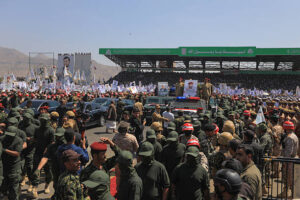The United Kingdom on Monday rejected Emmanuel Macron’s call for an arms embargo against Israel. The Minister of Defence, John Healey, has made it clear that Great Britain will not join the position of France in the context of the escalation of the conflict in the Middle East. Asked if Britain supports the approach of the French president, Healey replied: “No, we work in a different system. As a government, we do not offer anything directly to Israel. But where there are export licenses that put a clear risk of violating international law, we suspend them when they could affect life in Gaza. The cabinet minister added on Sky News: “The most important thing for all of us today is that we double down, the Middle East cannot be Don’t let another year be like the last one.” “We have to redouble our efforts to reduce the risk of a wider war, of an escalation,” he explained. “We need a cease-fire in Lebanon that allows the implementation of the UN plan for a separation zone between the Israelis and the Lebanese Hezbollah, and a cease-fire in Gaza so that we can remove all the hostages to be able to flood the area. help and we can begin to see the kind of dialogue that can lead to a long-term solution and peace, to a two-state solution so that the Palestinians have their own state and that the Israelis can live in peace and security.” Israeli Prime Minister Benjamin Netanyahu spoke by phone with Mr. Macron on Sunday, his office said, and told him that imposing restrictions on Israel would only serve Iran and its proxies. The French president said on Saturday that shipments of weapons to Israel used in the Gaza war should be stopped as part of a wider effort to find a political solution to the conflict. “As Iran supports all parts of the Iranian terrorist axis, friends of Israel must support and not impose restrictions that only strengthen the Iranian axis of evil,” Netanyahu told Mr. Macron office. Israel has sharply stepped up its attacks against the Iranian-backed Lebanese group Hezbollah in recent weeks, following a year of low-intensity cross-border conflict waged alongside Israel’s war against Palestinian militants. Hamas, also supported by Iran, after the October 7 attacks. Israel last year. Britain has urged its citizens to leave Lebanon and take charter flights to help them out as the conflict escalates. The British government announced in September that it was suspending around 30 arms export licenses to Israel, fearing there was a “clear risk” they could be used to violate international humanitarian law. Foreign Secretary David Lammy said a review by the British government could not “determine whether or not Israel violated international humanitarian law” in Gaza, but that ministers had a legal duty to review the export licenses. Mr Lammy pointed out that the criteria say the government will not issue export licenses if there is a “clear risk that the items could be used to commit or facilitate serious violations of international humanitarian law”. The suspension of about thirty arms export licenses was made out of a total of about 350 to Israel. But the calls of the West and others for a de-escalation of the conflict in the Middle East have gone unnoticed. Asked about the evidence that last year showed that the United States, Great Britain and the United Nations have “no influence” in the region, the Secretary of Defense Mr. Healey told BBC Breakfast: “I had extensive discussions with the Israeli Defense Minister Yoav Gallant. I told him that Israel must do more to reduce the number of civilian casualties in Gaza. The number of civilian deaths is intolerable, but we also recognize the right of Israel to defend itself against these terrorist attacks and against Iran, the country that supports this terrorism throughout the Middle East And yes, of course, diplomacy is difficult, but we are determined to continue, because it is, then, the only way to end the struggle and anxiety we had today.




